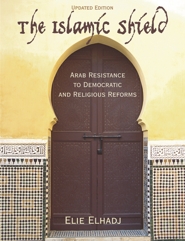
The Islamic Shield
Arab Resistance to Democratic and Religious Reforms
by Elie Elhadj
- Number of Pages: 272
- ISBN-10: 1599424118
- ISBN-13: 9781599424118
- Publisher: BrownWalker Press
- Year: 2008
- Category: Political Science, Philosophy, & Theology
Synopsis
Washington’s “War on Terrorism” has used democratization of the Arab World as a justification and a weapon. The Islamic Shield contends that genuine religious and political reforms in the Arab World are sheer fantasy: they are not expected for a very long time, if ever.The Islamic Shield argues that democratic ideology cannot defeat Islamic theology. A culture of blind obedience to autocratic authority at home, school, mosque, and work place has been turned into a form of piety by the ulama clerics.
The Islamic Shield focuses on the interaction between political Islam and world politics. The book analyses the likely consequences of Arab resistance to political and religious reforms in the Middle East and beyond, especially the Arab-Israeli conflict and the U.S. project in Iraq. The book examines the factors, which might prompt young, sometimes affluent and educated men and women to self-annihilate. In addition to a deficit of freedom, extremist Islamist indoctrination as well as domestic and foreign political factors are identified. The book concludes that politically expedient solutions will fail to defeat Jihadism and terrorism.
The Islamic Shield examines why democratic institutions are a mirage in two profoundly different countries, Saudi Arabia, an Islamist monarchy, and Syria, a quasi-secular republic. Although the two countries differ in types of governance, ideologies, agendas, and resources, they share in common non-representative, non-participatory dictatorial regimes. The two countries approximate socio-political models found in other Arab monarchies and republics.
The Islamic Shield examines such questions as: How likely is it that a future Arab Martin Luther, or a Kemal Ataturk might emerge? Why do non-Arab Islamic countries elect women as prime ministers and presidents while Arab ulama and most Arab rulers treat women as lesser beings and condemn democracy as un-Islamic? Is benevolent dictatorship a viable alternative to Arab democracy? How likely is it that extremist Islamist teaching will be moderated? Who shapes the Islamic persona? Is Islamic law changeable? If yes, who may change it? What might the legacy of the George W. Bush administration be in the Muslim world? What might be the eventual outcome of the “War on Terrorism”?



 View or Post a Review at Amazon.com
View or Post a Review at Amazon.com